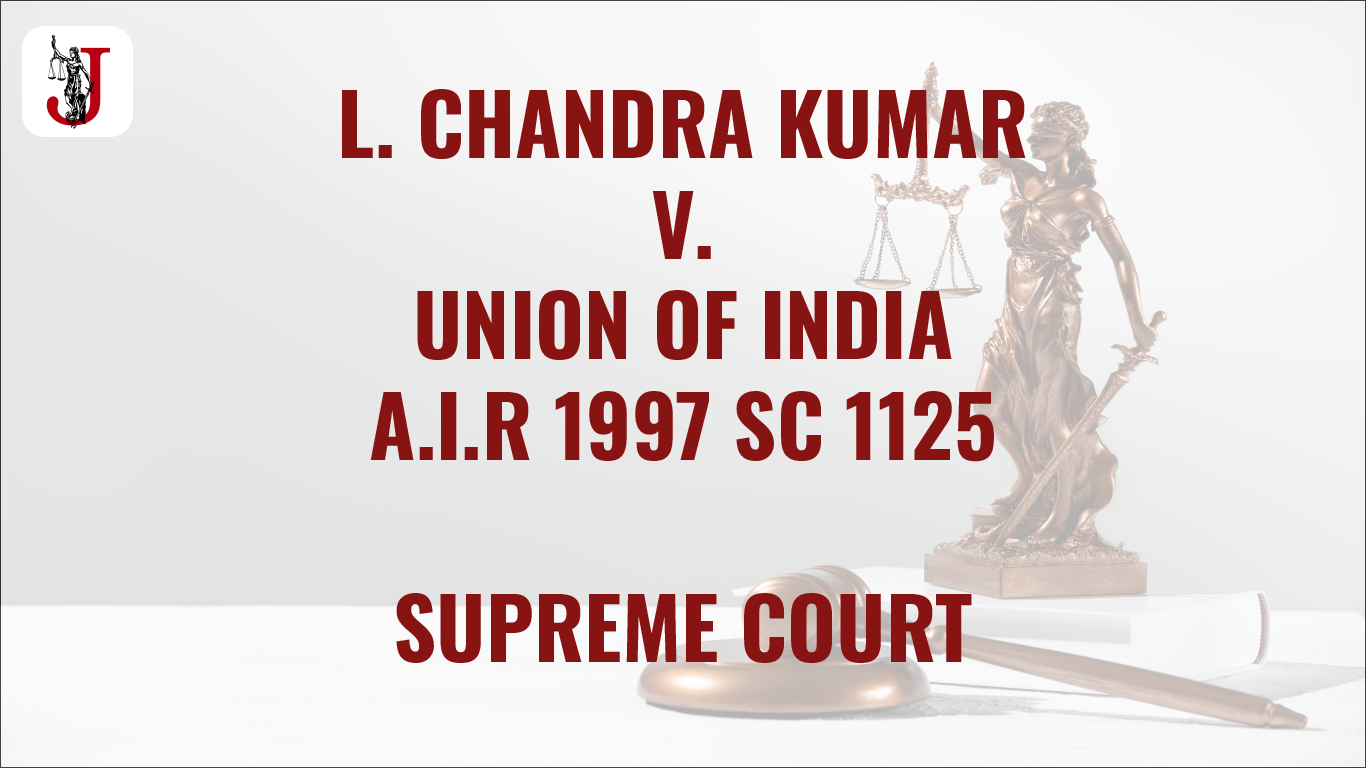A.I.R 1997 SC 1125
Introduction
In 1958, the Law Commission submitted a report recommending setting up a tribunal consisting of administrative and judicial members to decide service matters on its own, as the judicial system of that era felt it was a burden to solve each and every case of all the matters.
In 1969, Justice J.C. Shah of the Supreme Court, who was the Chairman of the Administrative Reform Commission, also recommended setting up civil service tribunals for both State and Central civil servants.
Again, in 1975, it was recommended by the Swaran Singh Committee.
Facts
The 42nd Constitutional Amendment Act of 1976 inserted Part XIVA in the constitution. The two Articles 323 A and 323 B prove the establishment of tribunal courts. Controversies were started regarding the constitutionality of those articles, as they curtailed the power of all courts, including the High Court. It was said that the exclusion of the jurisdiction of the High Court in relation to the service matter was unconstitutional.
Parliament also enacted the Administrative Tribunals Act 1985 to implement the amendments.
Issues
1. Whether Articles 323A and 323B totally exclude the jurisdiction of all courts except the Supreme Court under Article 136.
2. Whether tribunals so constituted have the constitutional validity of a statutory provision or rule
Arguments of the Defendants
The State quoted the Supreme Court judgment in the Sampath Kumar case, where the ld. court held that though judicial review is a basic feature of the constitution, vesting the power of judicial review in an alternative institution by taking it away from the High Court will not violate the basic structure.
The state also said that in the M.B. Majumdar Case, the ld. SC held that tribunals under the Administrative Tribunal Act had been equated to high courts only to the extent they would act as substitutes in adjudicating service matters.
Arguments of the Petitioners
- The petitioner argued that the Supreme Court and High Courts are the sole representatives of judicial review.
- This power includes the power to pronounce the validity of statutes, actions taken, and orders passed by individuals and bodies falling within the ambit of ‘State’ under Article 12 of the Constitution.
- This power has been entrusted only to the constitutional courts.
Judgement
- The Supreme Court, in its seven-judge bench, held that Clause 2(d) of Article 323 A and Clause 3(d) of Article 323 B, which exclude the jurisdiction of the High Court and Supreme Court under Articles 226 and 32, are UNCONSTITUTIONAL.
- The SC said that the tribunal can check the constitutional validity of the subordinate legislation, but if the tribunal takes any decisions on the statues made by the State or Parliament then the High Court has the right to judicially review that decision of the tribunal.
- If the party cannot be satisfied with the decisions of the tribunals, he may appeal in the High Court and Supreme Court, respectively.
Conclusion
In conclusion, it can be said that in this case, the Supreme Court made it clear that the High Court cannot be substituted by the tribunals, and the judicial review by the High Court and Supreme Court is part of the basic structure of the Constitution. The tribunals only act as the subordinate organs of the High Court.
Youtube facebook whatsapp web weather translate google amazon gmail google translate Instagram cricbuzz traductor Hotmail restaurants satta king tiempo twitter googel maps Yandex Sarkari result clima hotels fb yahoo maps chatgpt yahoo mail weather tomorrow Netflix roblox nba wordle tradutor livescore premier league ibomma speed test canva pintrest outlook Instagram login omegle flipkart myntra paypal paytm Alibaba ebay lottery sambad linkedin tiktok shein bbc news real madrid gmail login Walmart ikea cricket snaptik flashscore English to hindi twitch google scholar Barcelona Sarkari Naukri matrimonial shadi lgbtq third gender woman children Advocate barrister vakil supreme court high court commissioner exams ll.b ll.m ugc net law ph.d. m.b.a. graduation degree certificate school additional session judge civil judge justice jurists crime criminology punishment capital sentence death warrant fine constitution of india criminal procedure code civil procedure code evidence act sale of goods act arbitration act all india bar exam lower judiciary higher judiciary additional district attorney contract act amendment act u.s. constitution Canada p r section article schedule judgment vacancy post Porsche louis Vuitton chanel Gucci Hermes dior cartier rolex titan tiffany & co Ferrari estee lauder coach lancome burberry prada omega yves saint Laurent Lamborghini ray-ban Armani Moncler tata reliance Givenchy celine Bentley tag Heuer sk-II can cleef & arpels bulgari Shangri-la lao feng xiang dabur baidyanath cipla birla monte carlo loewe rolls-royce bottega-veneta jaege-leCoulture Maserati valentino dolce & gabbana Salvatore Ferragamo sulwhasso tom ford Maruti Suzuki Hyundai kia intercontinental Tissot aston martin ysl beauty fendi Versace kenzo la mer longines gold price sensex human rights pollution
